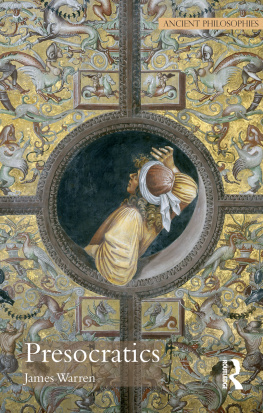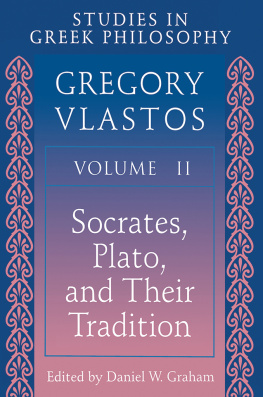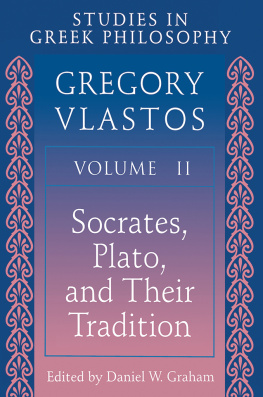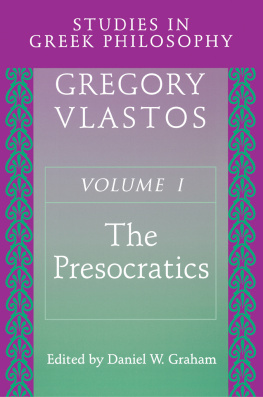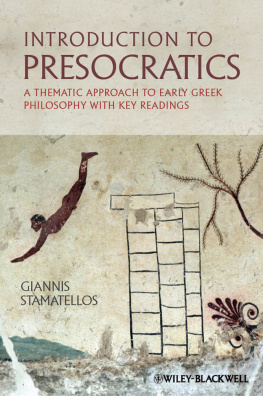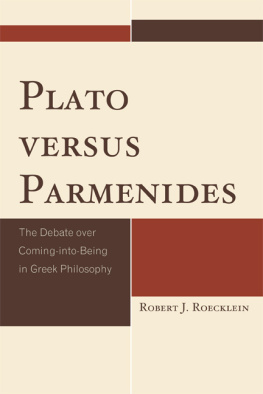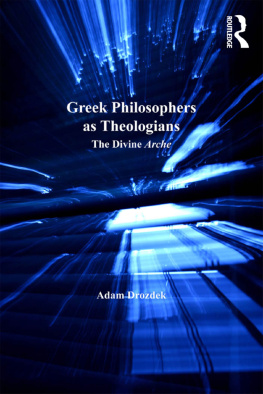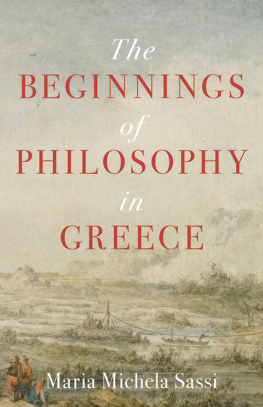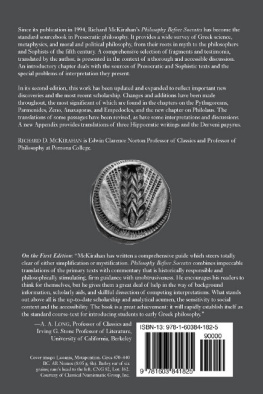Presocratics
Ancient Philosophies
This series provides fresh and engaging new introductions to the major schools of philosophy of antiquity Designed for students of philosophy and classics, the books offer clear and rigorous presentation of core ideas and lay the foundation for a thorough understanding of their subjects. Primary texts are handled in translation and the readers are provided with useful glossaries, chronologies and guides to the primary source material.
Published
Stoicism
John Sellars
Presocratics
James Warren
Forthcoming
Ancient Commentators of Plato and Aristotle
Miira Tuominen
Aristotle
Monte Johnson
Cynicism
William Desmond
Epicureanism
Tim O'Keefe
Neoplatonism
Pauliina Remes
Plato
Andrew Mason
Scepticism
Harald Thorsrud
Socrates
Mark McPherran
Presocratics
James Warren
For Rhiannon and Niamh, two early thinkers
First published in 2007
by Acumen
Published 2014
by Routledge
2 Park Square, Milton Park, Abingdon, Oxon OX14 4RN
711 Third Avenue, New York, NY 10017, USA
Routledge is an imprint of the Taylor & Francis Group, an informa business
James Warren, 2007
This book is copyright under the Berne Convention.
No reproduction without permission.
All rights reserved. No part of this book may be reprinted or reproduced or utilised in any form or by any electronic, mechanical, or other means, now known or hereafter invented, including photocopying and recording, or in any information storage or retrieval system, without permission in writing from the publishers.
Notices
Practitioners and researchers must always rely on their own experience and knowledge in evaluating and using any information, methods, compounds, or experiments described herein. In using such information or methods they should be mindful of their own safety and the safety of others, including parties for whom they have a professional responsibility.
To the fullest extent of the law, neither the Publisher nor the authors, contributors, or editors, assume any liability for any injury and/or damage to persons or property as a matter of products liability, negligence or otherwise, or from any use or operation of any methods, products, instructions, or ideas contained in the material herein.
ISBN: 978-1-84465-091-0 (hardcover)
ISBN: 978-1-84465-092-7 (paperback)
British Library Cataloguing-in-Publication Data
A catalogue record for this book is available from the British Library.
Designed and typeset in Minion by Kate Williams, Swansea.
Contents
As a new Classics student in Cambridge, the first ever philosophy lecture I attended was on the Presocratics, I had no intention at that time of studying philosophy seriously and I remember being confused by the idea that studying philosophy involved thinking about people who thought the world was made of water. But something about that lecture - given by Malcolm Schofield - must have made me come back for more.
There are a number of good books on early Greek philosophy and I have learned a lot from them. My hope is that, in a crowded field, this book manages to convey what I take to be the variety and importance of the philosophy at that time, together with an impression of how to go about thin king more deeply about these philosophers, both in terms of how to approach them in a philosophical way but also in terms of how to approach and handle the surviving, often frustrating, conflicting, and meagre, evidence. If I leave a number of interpretative issues open, that should stand as an invitation to further enquiry as well as an indication of the difficulty of drawing unquestionable conclusions about many of these philosophers. (I hope that I might be forgiven, therefore, for the often lengthy strings of further references in the notes. I thought it important to point readers in the direction of the various competing interpretations should they want to pursue a given topic.) There are, of course, many things I would have wanted to explore in greater detail. Nevertheless, I hope that readers might be encouraged by what I have included to go and think more about what I have not had space to discuss.
One of the irritations of working on these early philosophers is that it becomes necessary to deal with a variety of different numberings of the various fragments and testimonia as different editors and translators impose their own orderings. I have therefore decided to give references to the Diels-Kranz edition wherever possible with the thought that, although Diels-Kranz do not provide translations into English, all good later editions and translations either use their numbering or include at least a concordance to Diels-Kranz so the appropriate text can be found without too much difficulty.
Thanks are due, as ever, to my students for telling me when I was not making much sense and to my colleagues for showing me how to think and write about ancient philosophy Drafts of various chapters or of the whole book were read and commented on by Jenny Bryan, Eric James, Sara Owen, Kelli Rudolph and the anonymous readers for the publisher; my thanks to them all. Special thanks also to Jason Lucas for the map on p. xv. Most of the work for this book was completed during sabbatical leave for the Michaelmas term 2005 and the Lent term 2006; warm thanks to my faculty and college colleagues who covered various duties for me. Thanks also to Steven Gerrard, who suggested that I should write this book as part of Acumen's Ancient Philosophies series and kept faith with the project as it progressed.
This book is dedicated to two people who ask lots of questions. I hope they never stop.
JIW
Cambridge, December 2006
The following texts are the ancient sources referred to, and serves as a guide to the abbreviations used in this volume.
- Aet. (= Atius), 1st/2nd century CE collector of philosophical views
See H. Diels, Doxographi Graeci (Berlin: de Gruyter, [1879] 1965) and Mansfeld & Runia (1997). - Aristophanes, c .446- c .388 BCE, Athenian comic dramatist
- Aristot. (= Aristotle), 384-322 BCE, philosopher
- De an. = De Anima ( On the Soul)
- De caelo = De Caelo (On the Heavens)
- EE = Eudemian Ethics
- Gen. an. = De Generatione Animalium (On the Generation of Animals)
- Gen. et. Corr. = De Generatione et Corruptions (On Coming to Be and Passing Away)
- Met. = Metaphysics
- Meteor. = Meteorology
- NE = Nicomachean Ethics
- Phys. = Physics
- Pol. = Politics
- Rhet. = Rhetoric
- Cic. (= Cicero), Roman statesman, orator and writer
- Acad. = Academica
- De nat. deorum = De Natura Deorum ( On the Nature of the Gods )
- Tusc. = Tusculan Disputations
- Diog. Laert. (= Diogenes Lartius), 3rd century ce author of Lives of the Eminent Philosophers
- Dionys. ap. Eus. PE = Dionysius, 2nd century ce bishop of Corinth, quoted in Eusebius's (2nd-3rd century CE bishop of Caesarea) Praeparatio Evangelica
- DK = H. Diels and W. Kranz, Die Fragments der Vorsokratiker (6th edition, Berlin: Weidmann, 1951)
- Epicurus, 341-270 BCE, philosopher, founder of Epicureanism Letter to Herodotus
- Galen, 129- c .199 CE, doctor and philosopher

